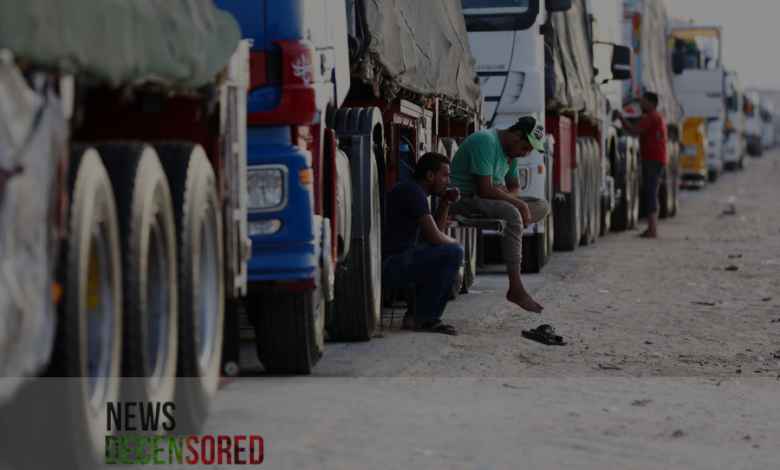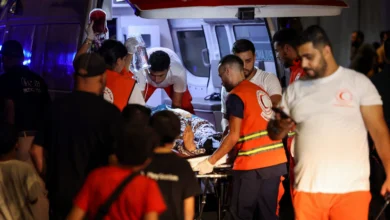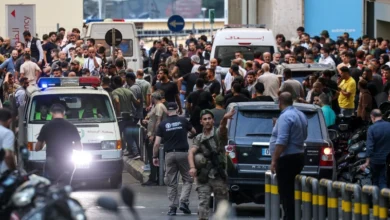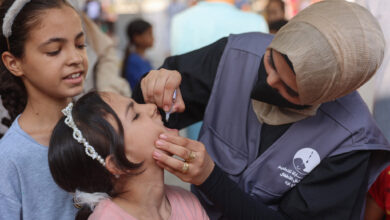Humanitarian Aid Stranded at Egyptian Border as Gaza Crisis Deepens

AL-ARISH, Egypt, July 8 (Reuters)—Hundreds of trucks carrying goods have been stuck in the Egyptian desert, some for over two weeks, waiting to cross into Gaza with desperately needed food and water.
About 31 miles off the Gaza border, trucks loaded with flour, water, and other relief items are parked on a dusty road in both directions. The drivers, sweating in the scorching Egyptian summer, say they have been waiting for several weeks.
The standstill is deepening Gaza’s already severe humanitarian situation following nine months of the Israel and Palestinian militant group Hamas conflict. The humanitarian organizations state that the potential of famine on the besieged coast is very high.
The truck drivers who are stranded in al-Arish in the Sinai Peninsula cannot bring humanitarian aid since the escalation of the operation by Israel on the Gaz-Egypt border in May. Some of the food has been spoiled.
“I swear to God, before this load, we came here and stood for more than 50 days, and eventually, the load was returned because it had expired,” said truck driver Elsayed el-Nabawi. “We had to turn around and return it. We loaded another batch, and here we are standing again, and only God knows if this load will make it before it expires or what will happen to it.”
Border Crossing Closure
Israeli forces started pounding the Paz city in the south of the Gaza Strip in May. Since then, the Rafah border between Gaza and Egypt, considered the only main route for bringing food and medicine and transferring sick people, has been closed.
Efforts to deal with Egypt, Israel, and the United States their negotiations with have not led to the re-opening of Rafah. Egypt also demands the Palestinians remain on the Gazan side of the border. However, now, flags of Israel are being seen over the Gazan buildings that are demolished along the border of Egypt.
“We’ve been stranded here for over a month waiting to deliver this load,” said Ahmed Kamel, another truck driver. “We don’t know our fate – when we will be able to enter? Today? Tomorrow? The day after tomorrow? Only God knows. Will the stuff we carry hold up, or most of it will go bad?”
Aid Shortages and Distribution Challenges
Though aid and commercial supplies have continued to reach Gaza through the other ground borders, the airspace, and the sea, according to the human rights agencies and the Western ambassadors, the quantity needs to be more adequate. The truck drivers claim they are still waiting to get permission from Israel.
Aid distribution was already tricky in Gaza before the intense attack on Rafah by Israel. In this regard, Israel has also imposed measures in an attempt to ban specific goods that it does not want to reach Hamas. A few relief caravans have also been targeted in Israeli aerial bombings, and some drivers and assistants have been killed.
Palestinian gangs inside Gaza have also made attempts to steal aid and commercial products. Dying Palestinians have mobbed trucks and appropriated an excellent part of the required humanitarian help.
An Israeli foreign ministry official explained that aid remained stocked up in Egypt because humanitarian supplies accumulated on the Gaza side of the Kerem Shalom crossing point, totaling approximately 1,200 trucks.
The official also pointed out that while Israel continues to permit the delivery of stuff into the Gaza Strip, the distribution networks of humanitarian internationals in Gaza have been described by the official as ‘interrupted’ in the recent past due to culprits the official identified as ‘criminally inclined’ Palestinians and Hamas.
Malnutrition and Medical Evacuations
The Israeli military force responsible for managing the deliveries of aid to Gaza insists that it allows adequate food from Israel and Egypt for the population. However, it admits that such crossing points are not without ‘challenges’ in the aid agencies ‘logistics/carrying of food items.’
An assistant minister in the UAE foreign ministry and a qualified doctor, Maha Barakat, said the Palestinians who can escape Gaza are weak and malnourished. The UAE has participated in the medevacs from Gaza.
“They are becoming thinner and thinner,” Barakat said aboard a chartered flight organized by the UAE government to al-Arish. She said this led to the realization that wounds could not heal due to malnutrition. ‘Well, they are slowly crossing over to more than just injuries of war, she said. ’
Battles and the siege cause worsened the situation in the Gaza Strip since the necessary food, medicine, and other essentials cannot reach those people who need them.




